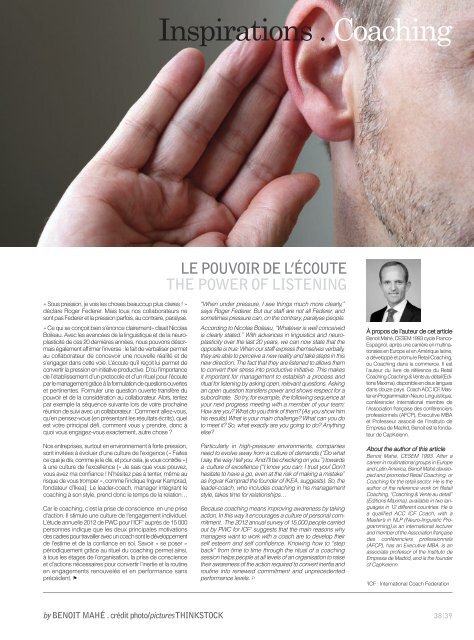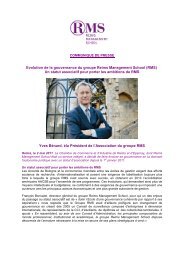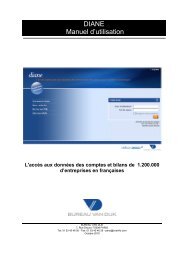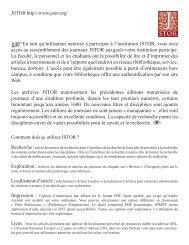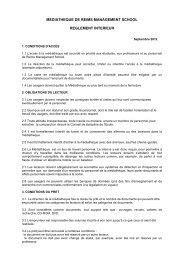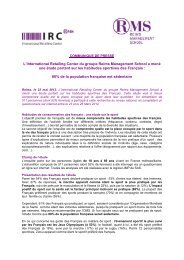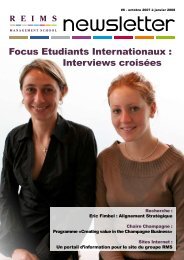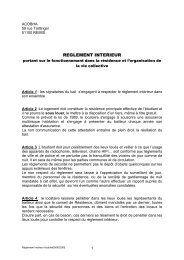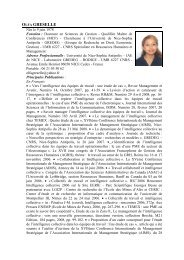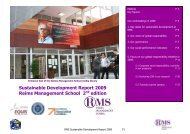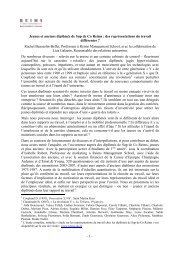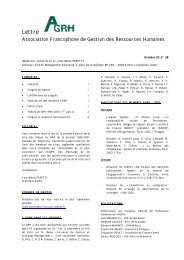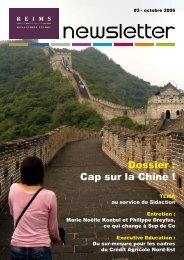tÉLÉCHARGEZ ICI ! le dernier numéro du magazine - Reims ...
tÉLÉCHARGEZ ICI ! le dernier numéro du magazine - Reims ...
tÉLÉCHARGEZ ICI ! le dernier numéro du magazine - Reims ...
Create successful ePaper yourself
Turn your PDF publications into a flip-book with our unique Google optimized e-Paper software.
« Sous pression, je vois <strong>le</strong>s choses beaucoup plus claires ! »<br />
déclare Roger Federer. Mais tous nos collaborateurs ne<br />
sont pas Federer et la pression parfois, au contraire, paralyse.<br />
« Ce qui se conçoit bien s’énonce clairement» disait Nicolas<br />
Boi<strong>le</strong>au. Avec <strong>le</strong>s avancées de la linguistique et de la neuroplasticité<br />
de ces 20 dernières années, nous pouvons désormais<br />
éga<strong>le</strong>ment affirmer l’inverse : <strong>le</strong> fait de verbaliser permet<br />
au collaborateur de concevoir une nouvel<strong>le</strong> réalité et de<br />
s’engager dans cette voie. L’écoute qu’il reçoit lui permet de<br />
convertir la pression en initiative pro<strong>du</strong>ctive. D’où l’importance<br />
de l’établissement d’un protoco<strong>le</strong> et d’un rituel pour l’écoute<br />
par <strong>le</strong> management grâce à la formulation de questions ouvertes<br />
et pertinentes. Formu<strong>le</strong>r une question ouverte transfère <strong>du</strong><br />
pouvoir et de la considération au collaborateur. Alors, tentez<br />
par exemp<strong>le</strong> la séquence suivante lors de votre prochaine<br />
réunion de suivi avec un collaborateur : Comment al<strong>le</strong>z-vous,<br />
qu’en pensez-vous (en présentant <strong>le</strong>s résultats écrits), quel<br />
est votre principal défi, comment vous y prendre, donc à<br />
quoi vous engagez-vous exactement, autre chose ?<br />
Nos entreprises, surtout en environnement à forte pression,<br />
sont invitées à évoluer d’une culture de l’exigence (« Faites<br />
ce que je dis, comme je <strong>le</strong> dis, et pour cela, je vous contrô<strong>le</strong> »)<br />
à une culture de l’excel<strong>le</strong>nce (« Je sais que vous pouvez,<br />
vous avez ma confiance ! N’hésitez pas à tenter, même au<br />
risque de vous tromper », comme l’indique Ingvar Kamprad,<br />
fondateur d’Ikea). Le <strong>le</strong>ader-coach, manager intégrant <strong>le</strong><br />
coaching à son sty<strong>le</strong>, prend donc <strong>le</strong> temps de la relation…<br />
Car <strong>le</strong> coaching, c’est la prise de conscience en une prise<br />
d’action. Il stimu<strong>le</strong> une culture de l’engagement indivi<strong>du</strong>el.<br />
L’étude annuel<strong>le</strong> 2012 de PWC pour l’ICF 1 auprès de 15 000<br />
personnes indique que <strong>le</strong>s deux principa<strong>le</strong>s motivations<br />
des cadres pour travail<strong>le</strong>r avec un coach sont <strong>le</strong> développement<br />
de l’estime et de la confiance en soi. Savoir « se poser »<br />
périodiquement grâce au rituel <strong>du</strong> coaching permet ainsi,<br />
à tous <strong>le</strong>s étages de l’organisation, la prise de conscience<br />
et d’actions nécessaires pour convertir l’inertie et la routine<br />
en engagements renouvelés et en performance sans<br />
précédent. ⚑<br />
by BENOIT MAHÉ . crédit photo/picturesTHINKSTOCK<br />
Inspirations . Coaching<br />
LE POUVOIR DE L’ÉCOUTE<br />
THE POWER OF LISTENING<br />
“When under pressure, I see things much more c<strong>le</strong>arly,”<br />
says Roger Federer. But our staff are not all Federer, and<br />
sometimes pressure can, on the contrary, paralyse peop<strong>le</strong>.<br />
According to Nicolas Boi<strong>le</strong>au, “Whatever is well conceived<br />
is c<strong>le</strong>arly stated.” With advances in linguistics and neuroplasticity<br />
over the last 20 years, we can now state that the<br />
opposite is true: When our staff express themselves verbally,<br />
they are ab<strong>le</strong> to perceive a new reality and take steps in this<br />
new direction. The fact that they are listened to allows them<br />
to convert their stress into pro<strong>du</strong>ctive initiative. This makes<br />
it important for management to establish a process and<br />
ritual for listening by asking open, re<strong>le</strong>vant questions. Asking<br />
an open question transfers power and shows respect for a<br />
subordinate. So try, for examp<strong>le</strong>, the following sequence at<br />
your next progress meeting with a member of your team:<br />
How are you? What do you think of them? (As you show him<br />
his results) What is your main chal<strong>le</strong>nge? What can you do<br />
to meet it? So, what exactly are you going to do? Anything<br />
else?<br />
Particularly in high-pressure environments, companies<br />
need to evolve away from a culture of demands (“Do what<br />
I say, the way I tell you. And I’ll be checking on you.”) towards<br />
a culture of excel<strong>le</strong>nce (“I know you can; I trust you! Don’t<br />
hesitate to have a go, even at the risk of making a mistake”<br />
as Ingvar Kamprad the founder of IKEA, suggests). So, the<br />
<strong>le</strong>ader-coach, who includes coaching in his management<br />
sty<strong>le</strong>, takes time for relationships…<br />
Because coaching means improving awareness by taking<br />
action. In this way it encourages a culture of personal commitment.<br />
The 2012 annual survey of 15,000 peop<strong>le</strong> carried<br />
out by PWC for ICF 1 suggests that the main reasons why<br />
managers want to work with a coach are to develop their<br />
self esteem and self confidence. Knowing how to “step<br />
back” from time to time through the ritual of a coaching<br />
session helps peop<strong>le</strong> at all <strong>le</strong>vels of an organisation to raise<br />
their awareness of the action required to convert inertia and<br />
routine into renewed commitment and unprecedented<br />
performance <strong>le</strong>vels. ⚐<br />
À propos de l’auteur de cet artic<strong>le</strong><br />
Benoit Mahé, CESEM 1993 cyc<strong>le</strong> Franco-<br />
Espagnol, après une carrière en multinationa<strong>le</strong>s<br />
en Europe et en Amérique latine,<br />
a développé et promu <strong>le</strong> Retail Coaching,<br />
ou Coaching dans <strong>le</strong> commerce. Il est<br />
l’auteur <strong>du</strong> livre de référence <strong>du</strong> Retail<br />
Coaching Coaching& Vente au détail(Editions<br />
Maxima), disponib<strong>le</strong> en deux langues<br />
dans douze pays. Coach ACC ICF, Master<br />
en ProgrammationNeuro Linguistique,<br />
conférencier international membre de<br />
l’Association française des conférenciers<br />
professionnels (AFCP), Executive MBA<br />
et Professeur associé de l’Instituto de<br />
Empresa de Madrid, Benoit est <strong>le</strong> fondateur<br />
de CapKe<strong>le</strong>nn.<br />
About the author of this artic<strong>le</strong><br />
Benoit Mahé, CESEM 1993. After a<br />
career in multinational groups in Europe<br />
and Latin America, Benoit Mahé developed<br />
and promoted Retail Coaching, or<br />
Coaching for the retail sector. He is the<br />
author of the reference work on Retail<br />
Coaching, “Coaching & Vente au detail”<br />
(Editions Maxima), availab<strong>le</strong> in two languages<br />
in 12 different countries. He is<br />
a qualified ACC ICF Coach, with a<br />
Master’s in NLP (Neuro-linguistic Programming),is<br />
an international <strong>le</strong>cturer<br />
and member of the Association française<br />
des conférenciers professionnels<br />
(AFCP), has an Executive MBA, is an<br />
associate professor of the Instituto de<br />
Empresa de Madrid, and is the founder<br />
of CapKe<strong>le</strong>nn.<br />
1 ICF : International Coach Federation<br />
38|39


